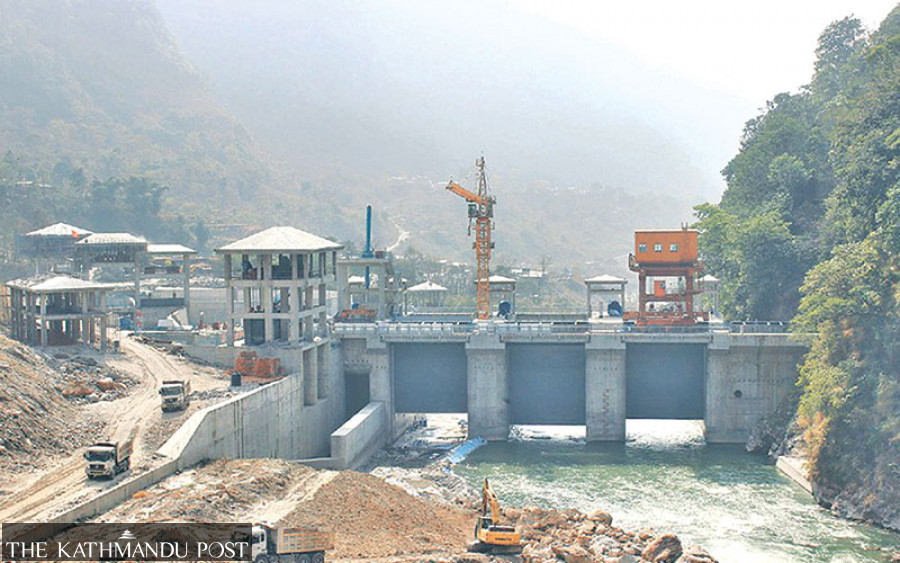Money
Nabil fails to cash hydel project bond from Chinese bank
Himalayan Bank, Bank of Kathmandu, and Investment Bank faced similar issues in the past in China and Italy.
Prithivi Man Shrestha
Nabil Bank is struggling to get a counter-guarantee amount from a Chinese bank, causing a delay in releasing the bank guarantee amount equivalent to $7.44 million (Rs991 million) to Trishuli Jal Vidyut Company.
After deciding to terminate the contract with Shuifa ANHE Group, the contractor hired to develop the 37MW Upper Trishuli 3B Hydropower Project, citing under-performance in December, the hydropower developer company, in early December, asked Nabil Bank to immediately release the Chinese contractor’s performance guarantee and advance payment guarantee equivalent to the aforementioned amount.
But the Chinese contractor moved a local Chinese court in Sichuan, China and the Chinese court ordered not to release the counter guarantee amount to Nabil Bank. After not getting the counter guarantee amount from China, Nabil is hesitating to release the sum to the Trishuli Jal Vidhyut Company (TJVC).
“We have received the claims [from Trishuli Jal Vidhyut Company],” said Manoj Kumar Gyawali, deputy chief executive officer at Nabil Bank. “We are discussing the matter following the Chinese court’s order.”
Nabil Bank has communicated the same to the TJVC, jointly established by the Nepal Electricity Authority (NEA) and Nepal Telecom, which is developing the Upper Trishuli 3B project.
Bank guarantee is sought by a project to ensure that the contractor does not run away after receiving funds from the employer, such as a company, or does not carry out construction as detailed in the contract. In the case of a foreign contractor, the counter-guarantee is also sought from a foreign bank.
Ananda Dhungel, chief executive officer at the TJVC, said that Nabil has not refused to issue the amount but is delaying the release.
“As we have nothing to do with the Chinese bank, Nabil must release the bank guarantee amount immediately,” said Dhungel. “We have also asked the Nepal Rastra Bank to intervene in this regard.”
Citing Nabil Bank’s notification, Dhungel said that China Everbright Bank had issued the counter-guarantee for the Chinese contractor.
The incident mirrors the troubles Himalayan Bank and the erstwhile Bank of Kathmandu went through to get the counter-guarantee amount released from the China Construction Bank in case of the Melamchi Water Supply Project.
Citing non-performance by the contractor (China Railway 15 Bureau Group), the Melamchi Water Supply Development Board had in 2012 terminated the contract with it.
When the board sought to seize its bank guarantee amount from the Himalayan Bank and the erstwhile Bank of Kathmandu, the Chinese contractor moved a local Chinese court, which prevented the China Construction Bank from releasing the amount.
These two banks had provided performance security of $6.62 million and a guarantee for advance payment amounting to $6.62 million and 1.4 million euros for the Chinese contractor.
After the Chinese bank refused to release the counter-guarantee amount, Himalayan Bank and the erstwhile Bank of Kathmandu also declined to give the equivalent amount to the Melamchi Board.
But the Patan Appellate Court, which has now become High Court, Patan, in January 2014 ordered the amount to be released to the Melamchi board.
The two Nepali banks then engaged in a decade-long legal battle in Chinese courts to secure the release of an equivalent amount from the China Construction Bank. The Chinese courts ruled in their favour in August 2022. The Bank of Kathmandu was acquired by the Global IME Bank last year.
The erstwhile Nepal Investment Bank Limited (NIBL) also engaged in a legal battle against Cooperativa Muratori e Cementisti di Ravenna (CMC), the former Italian contractor hired by the Tanahu Hydropower Company, in Italian courts to get a counter-guarantee equivalent to Rs1.6 billion released.
The Italian bank Intesa Sanpaolo, which had provided a counter-guarantee for the CMC, had failed to release the amount after a lower court in Bologna issued an order against doing so.
In March 2019, the Italian contractor registered a complaint at the local court in Bologna. A higher Italian court, in June 2020, had decided in favour of the NIBL, which has now become Nepal Investment Mega Bank Limited.
Nabil Bank faces a similar problem following the TJVC's demand that the bank guarantee of $7.44 million be released immediately.
“We sent a letter to Nabil Bank on December 1 last year to release the amount,” said Dhungel. “Fifty days into our request, the bank has yet to oblige, though it was supposed to do so within seven days.”
With Nabil delaying the amount, the hydropower development company had written to the central bank about three weeks ago seeking its intervention. “We followed it up with the central bank about 10 days ago,” said Dhungel.
In the past, after the Himalayan Bank and the Bank of Kathmandu refused to release a similar amount, the central bank had ordered them to keep equivalent amounts in provisioning, barring them from showing the sums as profit.
On the other hand, the TJVC has already secured the release of another bank guarantee amount in local currency from Laxmi Sunrise Bank.
“We had sent the requests to both the banks the same day, asking for the release of the bank guarantee amount,” said Dhungel. “We received the amount from Laxmi Sunrise Bank in early December last year.”
He said the company got around 200 million from the Laxmi Sunrise Bank in Nepali rupees.
With the Nepali banks repeatedly facing such problems, those dealing with such issues suggest banks be more vigilant of the track record of foreign banks with regard to payments related to international contracts.
Gandhi Pandit, a corporate lawyer who engaged in legal fights on behalf of Nepali banks in China and Italy, said the banks need to check the track records of foreign banks that offer counter-guarantees.
“Our banks should also be fully prepared to face legal challenges in a foreign country by hiring competent local and foreign lawyers from the date a foreign bank refuses to release the counter-guarantee sum,” he said. The initial hesitation of the Himalayan Bank and the erstwhile Bank of Kathmandu to engage in a legal fight in China led to the prolonging of the case in Chinese courts, Pandit added.
Citing the underperformance of the Chinese contractor, the TJVC issued a notice of termination to the contractor, which became effective in mid-December.
The Shuifa ANHE Group was awarded the project contract in March 2018 for Rs6.14 billion ($31.8 million plus Rs1.91 billion), requiring it to complete the work within three years.
But the completion deadline was extended by three years because of the Covid-19 pandemic and other problems.
“Since April last year, the contractor hardly used its equipment and workers at the project site despite our repeated warnings,” said Dhungel. “That’s why we had to terminate the contract.”
According to him, 70 percent of the project work is over. Now the company is preparing to seek more compensation from the Chinese contractor while also planning, within a month, to issue fresh tender for the remaining works.




 17.29°C Kathmandu
17.29°C Kathmandu














